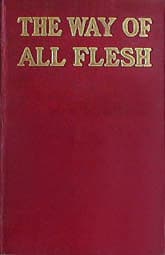The Way of All Flesh
 First edition
First editionFirst publication
1903
Literary form
Novel
Genres
Literary, social criticism
Writing language
English
Author's country
England
Length
Approx. 147,000 words
Bad novel, great book
Samuel Butler never published The Way of All Flesh in his lifetime, being unsatisfied with it. I can understand why he might have wanted to rework it. The story is skimpy, again being sandwiched among pages and chapters of the narrator's observations on everything in sight, including the raising of children in various societies, the schisms between Christian sects in the nineteenth century, and the qualifications he would set for getting into heaven would be if he were God. The story is told haltingly with big gaps, with an impatience that works against suspense or human interest.
All in all, this does make it sound like a total flop as a novel, certainly not one that anyone would want to read more than a century later.
But what a pleasant shock to find it a joy to read.
Those narrator commentaries are so interesting. At times they are breathtakingly cynical, even for our jaded times, as when he praises the faculty of children to die or adapt. Or their capacity for being tricked by their elders into blaming their misery on their own sinfulness.
The writing is often so clever. Passages to make you chuckle are found on almost every page.
Disastrous rebellions
The wit is supposedly in support of the story, which follows several generations of the Pontifex family but eventually settles on one young man. Ernest is dominated by parents we would today call "passive aggressive", using a pious and seemingly loving demeanor to bend him to their will, which seems to be a determination to ensure their first-born son never knows a moment of happiness in his life. He is manipulated into becoming an Anglican priest, like his father, and much of the novel follows his struggles to adapt to the Church—or adapt the Church to himself. The disasters that befall his rebellions provide Butler much opportunity to express dissent about both the Church and religious beliefs in general.
For some stretches both the character and the author delve too far into religious questions that concerned intellectual society of that time and have since been forgotten. But a surprising number of them are still around today in one form or another. The 1860s through early 1880s when the novel was written was a tumultuous time in religious circles. Darwin's new evolutionary theory was seen as a direct challenge to the teachings of the Church. Evangelist movements were rising to challenge the status quo from another angle. Although the particular fierce arguments of that day have long ago dissipated, the general questions are still with us today.
Butler comes down on the side of what might now be called secular humanism, although his narrator stops short of espousing outright atheism, leaving it murky exactly how far his critique of the Bible and the Church are meant to lead the reader.
Despite all the speculation on religion however, his main interest seems to be in exposing Victorian hypocrisy—the self-serving piety, the pursuit of social status while professing interest only in higher matters, the puritanical veneer over the lust for material wealth.
At times it is laid on too thick. The characters risk becoming caricatures, like some of Dickens's duplicitous villains, like Uriah Heep. But then Butler pulls back and reveals a more human complexity and compassion that can jar with his otherwise scathing indictment.
Yes, I can see how it could have been improved with editing. I wouldn't mind having a crack at it myself.
But as it stands, The Way of All Flesh is still worth reading today.
— Eric

